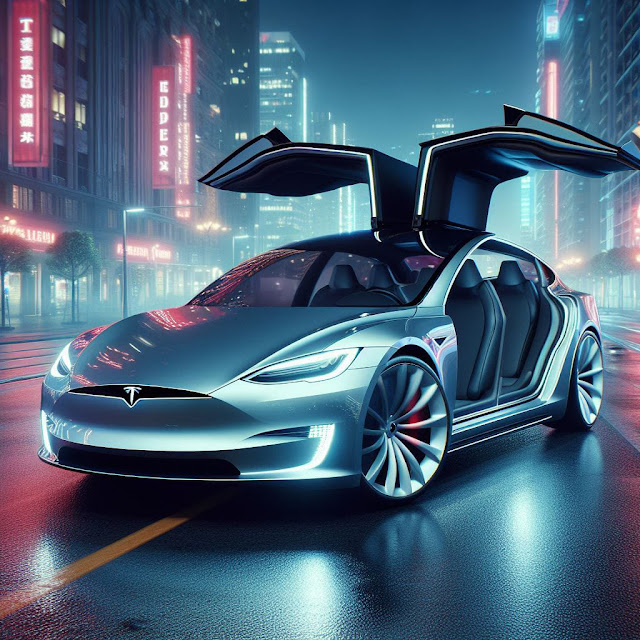TESLA'S ELECTRIC
Tesla was founded in 2003 by Martin Eberhard and Mark Tarpenning and later backed by Elon Musk. The aim is to accelerate the global transition to sustainable energy. Musk led Tesla's Series A financing in 2004 and became its CEO.
The company has made a name for itself with electric vehicles such as Roadster, Model S, Model 3 and Model with renewable energy solutions. Musk's vision goes beyond cars to include energy storage and photovoltaic products, all contributing to a more sustainable future.
The first challenges for the electric car industry: The electric car industry initially faced challenges such as limited range, high costs and a lack of charging infrastructure. The first electric vehicles were met with skepticism due to range issues, as the range they could travel on a single charge was limited. Battery technology was expensive and made accessibility difficult. Additionally, inadequate charging stations have hampered mass adoption.
Doubts about the performance of electric vehicles and concerns about battery life have also discouraged consumers. Overcoming these obstacles requires advances in battery technology, significant investments in charging infrastructure, and consumer education to dispel misconceptions, which will ultimately pave the way for the growth and adoption of electric vehicles in the automotive market. She does.
The founders and early vision of Tesla: Tesla Motors was founded in 2003 by Martin Eberhard and Mark Tarpenning and aimed to revolutionize transportation with electric vehicles. Shortly thereafter, Elon Musk came along and led Tesla's Series A financing in 2004.
Musk's influence drove electric vehicles into the mass market and led to the production of the Roadster, Model S, Model 3, Model X and Model Y. Tesla's first vision was to revolutionize automotive development in the industry, integrating electric cars and developing sustainable energy solutions. Promote the transition to a greener and more energy efficient transport system.
Development and launch of the Tesla Roadster: Tesla's Roadster, introduced in 2008, marks a turning point for electric cars. The Roadster, designed by Martin Eberhard and Mark Tarpenning, was Tesla's first production vehicle. Elon Musk, who became a major investor and CEO, played a key role in improving design and manufacturing. The Roadster used a Lotus chassis and demonstrated that electric cars could be desirable and successful.
Its 245-mile range, powered by lithium-ion batteries, breaks stereotypes. Despite initial challenges, the success of the Roadster paved the way for subsequent Tesla models, proving that electric vehicles could be both sustainable and exciting, and changing the concept of electric mobility around the world. .
The Turning Point:
Elon Musk's entry and influence on Tesla: Elon Musk came to Tesla in 2004, invested there and became CEO. His ambitious vision has transformed the company from an electric carmaker into a global force shaping the future of transportation and energy.
Musk's hands-on approach revolutionized manufacturing processes, drove innovation in battery technology, and promoted mass market access, leading to the development of the Model S, Model 3, and more.
Musk's relentless pursuit of sustainable energy, bold public announcements, and marketing expertise not only shaped Tesla's identity, but also brought electric vehicles into the mainstream and made the company a leader in the automotive and renewable energy sectors Energies. Once Tesla's position has stabilized.
Introduction of the Model S and its impact on the electric car market: The Tesla Model S, introduced in 2012, revolutionized the electric car market. Combining sleek looks and cutting-edge technology, Model S offered an impressive range of more than 300 miles on a single charge. Its acceleration and performance rivaled that of traditional luxury cars and challenged misconceptions about electric vehicles. Model S sets a new standard for electric vehicles, impressing the competition and accelerating the industry's transition to high-performance, long-range electric vehicles. Its success not only solidified Tesla's position, but also helped change consumer perceptions, making electric cars desirable and demonstrating the feasibility of sustainable and efficient transportation.
Innovative Technologies:
Autopilot and Full Self-Driving capabilities: Tesla's Autopilot, introduced in 2014, is an advanced driver assistance system that offers features such as adaptive cruise control and lane keeping assist. Introduced in 2016, the Full Self-Driving (FSD) system offers ultimate autonomy with features such as automatic lane change and recall.
Despite its development, FSD is a driver assistance system whose full autonomy is subject to regulatory review. Autopilot and FSD have sparked a debate about safety, ethical considerations and the speed of development.
While Autopilot increases driver comfort, achieving true autonomous driving capabilities is challenging. Therefore, it is critical for Tesla to balance innovation with safety and regulatory compliance in the emerging autonomous driving landscape. Ost.
Battery technology advancements and the pursuit of sustainable energy: Advances in battery technology have played an important role in achieving sustainable energy, particularly in electric vehicles and renewable energy storage.
Innovations such as high-efficiency, high-energy-density lithium-ion batteries have expanded the range of electric vehicles and improved overall efficiency. Tesla has played a key role in increasing production and reducing costs through its gigafactories.
Improved batteries facilitate grid storage by enabling the integration of renewable energy sources. As energy demand continues to grow, continued research into next-generation battery technologies, such as B. Solid-state batteries have the potential to revolutionize the energy landscape by making sustainable, clean energy more accessible and widespread.
Market Impact:
ESA's influence on the automotive industry and competitor: Tesla's impact on the automotive industry is huge, leading to a strong transition towards electric vehicles. Its success has encouraged conventional car manufacturers to invest heavily in electrification.
Tesla's focus on innovation, efficiency and autonomy sets industry standards and forces competitors to accelerate technological development. The size of gigafactories has changed manufacturing standards and emphasized vertical integration. Tesla's direct-to-consumer model challenged the traditional dealer structure.
Despite initial skepticism, Tesla's stock market valuation and sales figures have forced competitors to prioritize electric vehicle development, redefine their strategy and recognize the inevitability of a sustainable future. Tesla has been found to have a lasting impact on the dynamics of the entire automotive industry.
There is a cultural shift towards electric vehicles (EVs): As environmental awareness increases and governments prioritize sustainability,. Tesla's success has made electric vehicles exciting and thus changed the concept of environmentally friendly transportation.
Advances in battery technology, expansion of charging infrastructure and government incentives are driving this change. Consumers are attracted to electric vehicles because of their low greenhouse gas emissions, reduced reliance on fossil fuels and lower operating costs.
As automakers around the world commit to phasing out internal combustion engines, the cultural narrative is shifting from traditional to electric, heralding an era of change in which electric vehicles are not just a conscious choice. Rather, it symbolizes an ecological and future-oriented lifestyle.
Beyond Cars:
Tesla's ventures into energy storage and solar technologies: Tesla's advances in energy storage and solar technologies extend beyond electric cars. The company's Powerwall and Power Pack systems provide scalable energy storage solutions for homes and businesses, promoting the sustainable use of electricity.
By acquiring SolarCity in 2016, Tesla expanded its solar capabilities and integrated solar panels with energy storage for a complete clean energy solution.
Gigafactories and their role in scaling up production: gigafactories play a key role in Tesla's strategy, ensuring scalability and efficiency of production. These facilities, like the Gigafactory in Nevada, centralize battery and vehicle production, reducing costs and supporting Tesla's ambitious production goals.
SpaceX and Elon Musk's broader vision for the future: Elon Musk's broader vision goes beyond Tesla to include SpaceX. His goals include colonizing Mars and creating a multidimensional humanity. SpaceX's advances in reusable rocket technology contribute to this vision by reducing the cost of space exploration.
Musk envisions a future in which renewable energy, electric vehicles and interplanetary travel redefine humanity's relationship with technology and the universe, reflecting a commitment to sustainability, innovation and exploring new frontiers. East.
Future Prospects:
Upcoming Tesla models and projects: The Tesla roadmap includes several expected models and designs. The Cybertruck, a fully electric pickup, is an example of Tesla's entry into new vehicle segments.
The Tesla Semi promises to revolutionize freight transport thanks to its electric motor. The continued development of FSD (Fully Self-Driving) technology underlines Tesla's commitment to autonomous driving.
The Impact of Competition and Changing Market Dynamics: As Tesla dominates the electric vehicle (EV) market, its competitors are stepping up their efforts. Traditional automakers like GM and Ford are investing heavily in electric models, which poses a challenge.
Changing market dynamics, such as government regulations supporting electric vehicles and growing consumer demand for sustainable options, are creating opportunities for collaboration and competition. Tesla's success has pushed the entire industry towards electronics.
Tesla's Role in the Future of Transportation: TheTesla remains a pioneer in transforming the future of transportation. Its impact goes beyond electric cars and includes energy storage, solar technologies and renewable energy integration.
Gigafactories enable scalable production and make clean energy solutions more accessible. Tesla's charging network innovations and Battery Day underscore the company's commitment to solving range challenges and advancing battery technology critical to mass adoption of electric vehicles.
The company's focus on autonomy is consistent with a future in which transportation will not only be electric but also increasingly automated.
Result:
Tesla's impact on the automotive industry and beyond is unparalleled. Future models and projects reflect its commitment to innovation and diversity and strengthen its position at the forefront of sustainable technologies.
Competitors' efforts underscore industry-wide recognition of the inevitability of electricity. Tesla's impact goes beyond corporate success and symbolizes a cultural shift toward clean energy and a redefinition of consumer expectations for transportation.
Because Tesla operates in an emerging market, its role in shaping the future of transportation remains critical as we move toward a more sustainable and technologically advanced automotive landscape.





.jpeg)






.png)
0 Comments